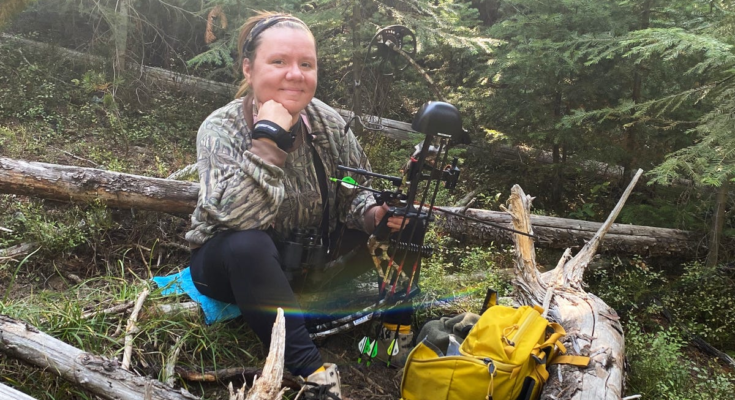
When I first started training for my elk hunting trip, I thought my biggest obstacle would be my lack of upper-body strength, my tendency to be very inconsistent with exercise routines, or an inability to shoot an arrow with precision and accuracy. But it turns out that—just like with any other sport—training and being “out in the field” are two very different things.
Fitness-wise, I met all of my training goals, and then some. I got my draw strength up to 45 pounds, five pounds higher than the requisite 40 pounds. I dialed in my shooting at 25 yards, which meant I was confident I could shoot and not miss at that distance, and wouldn’t try to shoot any farther. I even set and met some other, secondary fitness goals (my ass got bigger).
None of that translated into shooting an elk.
Shooting an immobile target and shooting a moving animal are very different activities. Aiming a lethal weapon at an inanimate object doesn’t get your adrenaline going. You don’t have to worry about missing a very rare opportunity, and you don’t have to grapple with ending a life or worse, injuring an animal, only to have it bolt away and spend several hours (or days) in pain and terrified.
Bow hunting is fucking hard, both physically and mentally. To quote my buddy Kurt, it’s “hours of boredom punctuated by moments of sheer terror,” and that is the best you can hope for. Physically speaking, I was quite uncomfortable the entire time, which, as someone who works from home in her pajamas most of the time, was something I wasn’t used to.
The area we were hunting in Eastern Oregon was about a mile high, and very dry, with a mixture of hills, valleys, meadows, and wallows. I saw a total of four elk, three of which were cows, and one spike (meaning it was only about a year old, and its horns had not yet branched). No one had cow tags this year, and the spike was not only too far for me to take a shot at, but up on a steep hill and obscured by trees. (Plus, my buddy Kurt saw him before I did, so the first shot went to him.)
G/O Media may get a commission

We saw the spike on the first day, as we were walking back from the wallow to the car. (We also saw a herd of Angus beef cows while sitting in the wallow, which was mildly startling but quite charming.) Kurt stalked it for a bit, but it got spooked and bolted. Later, at the camp, I asked my new buddy Roy—a friend of my buddy Kurt—how long he had been hunting. “Thirty-five years,” he said. “And how many elk have you killed?” “Eleven.”
Oh.
Before that moment, I “knew” that elk hunting would not be “easy,” but I had been so focused on the fitness aspect of it, I really hadn’t thought much about the likelihood of encountering an elk, and all the other stuff that went along with that.
It was, for example, much colder than I thought it would be. It was freezing nearly every night when we went to sleep, and every morning when we headed out before sunrise. Frost would form on my bow, and I would sulk and swear that I was not going to do this again next year. But then the sun would come out and I’d warm up and chill out, until the bald-faced hornets and yellow jackets began to buzz around my head. (I avoided getting stung until the last day, when my right ear swelled up to twice its original size.)

I also failed to consider the elevation. I didn’t get sick or feel especially tired, but I barely had an appetite the entire trip, which was a new feeling for me. I also didn’t feel like drinking, or ingesting any kind of fun substances. All I wanted to do was bury myself in multiple layers of clothing, dive deep down into two sleeping bags, and hopefully fall asleep before my body realized how cold it was.
On the second to last day, a herd of elk cows crossed the field, about 25 yards in front of our blind. My dad and I readied our arrows, and waited, hoping a spike or bull would follow, but that never happened. But just seeing the cows—which are improbable in size and stature—was enough to make me “get” it.
Hunting is boring, peaceful, frustrating, physically taxing, and sedentary all at once, and for some reason I want to do it again next year. Even though I didn’t kill anything, I learned that I am much tougher than I suspected, both mentally and physically, and discovered that I am capable of sitting still, without looking at a phone, for several hours at a time, which honestly seemed impossible before this trip. I don’t know if I would describe it as “fun,” but I do know that my dad and I have already made plans to go again next year. (We also plan to rent a van or trailer. The tent was just too cold.)
Beyond having a new hobby—one that I can share with my dad—elk hunting gives me a reason to keep going to the gym. I know that “being hotter” or “feeling good” don’t motivate me all that much, but—for some reason—a hunting trip does. In fact, with “the big trip” no longer looming, my gym attendance is not what it was a few months ago. I only went twice the two weeks immediately following the trip, but I’ve slowly increased it back up to three times a week. (The reason for the increase? I went target shooting in the field behind my dad’s house and found that my skills as an archer had degraded.)
It’s a little odd, and marginally unsettling, that the thing that motivates me to work out is the slim chance that maybe, if I go out into the forrest and sit very still in the cold while bugs swarm around my face, I might get a chance to shoot a large animal, and then eat that animal.
Maybe it shouldn’t be all that surprising. I may not be heavily motivated by vanity, but I am, and always have been, motivated by food.



